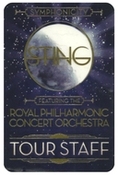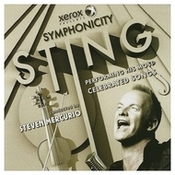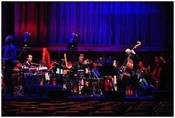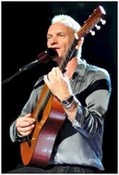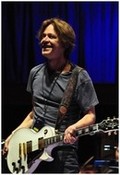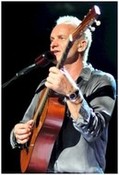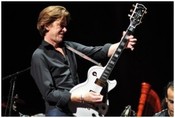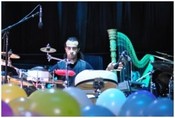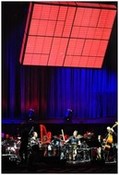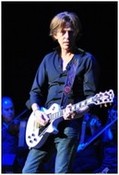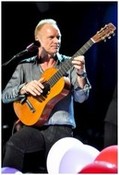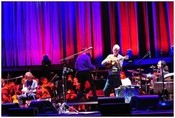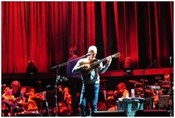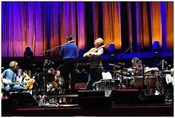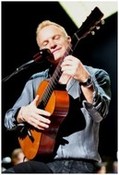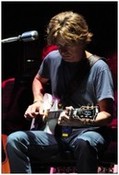
What's not to like about Sting's 'Symphonicity'?
Unless you happen to be Beethoven, writing music for an orchestra is fraught with danger. On many levels, Sting isn't Beethoven, nor, presumably, was the transsexual prostitute's tale 'Tomorrow We'll See' (let alone the bog-standard prostitute's tale 'Roxanne'), written with an orchestra in mind. No matter: after all there is no obvious reason why a rich back catalogue and an open-minded orchestra (the Royal Philharmonic) cannot make some kind of accommodation.
That he has not released a straightforward pop album since 2003 suggests his muse has taken flight, but Sting and self-belief remain on the most intimate of terms. He may have turned 59 on Saturday, but on Friday he showed he can still carry off spray-on trousers and still perform for an almost Tantric-length three hours.
Often, the pop-meets-orchestra marriage breaks down at the point where bolted-on classical players add a suggestion of class, but nothing else. Here, Sting won by surrendering his songs to the orchestra, who in turn surrendered themselves to exuberant presentation. 'Desert Rose', where Sting even allowed himself a wee jiggle, was a riot of sound; 'Every Breath You Take' swung like it's never swung before; 'Roxanne' sounded less shrill than usual and former lesser lights, especially a heroic 'A Thousand Years', were picked apart, put back together and emerged as genuine contenders.
Sting couldn't have been more Sting-like: shocking us by swearing like a naughty schoolboy; curling up on stage like an overly contented cat (or George Galloway) during 'An Englishman In New York's' clarinet solo and explaining how he helped halt the Cold War before a magnificent, timpani-laden rendition of 'Russians'.
Portentous, pretentious and pompous: what's not to like?
© London Evening Standard by John Aizlewood
Sting needs more bite...
When a leading rock band split up, it's a big story. When they reform, it's a big story all over again. When the reunion comes to an end, it's not a story at all, but perhaps it should be, because the repercussions can be formidable.
The 2007 reunion tour by The Police was a monster hit, raking in �£225m, then the third-highest gross for a single tour behind the Rolling Stone's 'A Bigger Bang' and U2's 'Vertigo'. But it seems to have rebounded on Sting, who has said it was like revisiting a dysfunctional marriage.
From the moment he walked out on The Police in 1984, his solo career had been sure-footed. He made a jazzy album, then settled into a mellow pop-rock sound that gave him room to dabble in roots and world music, He toured hard and sold consistently: his first seven solo albums all went platinum in America.
The eighth, 'Songs From The Labyrinth' (2006), was never going to follow suit being covers of Jacobean lute hits by John Dowland. But since then Sting has been stranded on Planet Obscure. Last year he made a Christmas album, 'If On A Winter's Night...', which was mostly classical, verging on funereal.
This year he released an album with the Royal Philharmonic Concert Orchestra, reinterpreting some of his hits. Lumbered with the title 'Symphonicities', it has gone platinum only in Poland. It's as if he is determined not to sell records.
The accompanying world tour has been dogged by reports of poor sales. At the Albert Hall, Sting manages two nights without filling every seat. But if he is worried by the wobble in his fortunes, it doesn't show.
At 59m he is alarmingly lithe in his skinny jeans. Sharing a stage with 50 musicians can be awkward, but Sting stands very still and radiates assurance while, just behind him, the conductor Steven Mercurio leaps around like a frustrated rock star.
Some songs lend themselves to layers or orchestration, some don't and some are little changed. An 'Englishman In New York', already much loved, gains from an elegant clarinet solo. 'I Hung My Head', the song about manslaughter that was covered by Johnny Cash, gets some dramatic colouring, which makes the words all the more stark.
'Shape Of My Heart', a beautiful lament about professional gambling, becomes sadder still with some gorgeous horns. But 'Roxanne', played early, falls flat, not least because the orchestra is bathed in red light, as mentioned in the lyrics. Memo to show designer: it's not that sort of red light.
The first half ends strongly with the limpid ease of 'Fields Of Gold' and the soul song 'Whenever I Say Your Name'. As Sting duets with his backing vocalist, the Australian jazz singer Jo Lawry, their voices rise and blend like smoke from neighbouring chimneys.
It's a long show, and feels like it early in the second half as Sting indulges in a couple of dirges, either side of a sharp, caberet-ish version of 'Moon Over Bourbon Street'.
But he knows exactly how to time his sprint to the tape, with a punchy 'King Of Pain' setting up the eternal centrepiece of 'Every Breath You Take', followed by the Saharan exuberance of 'Desert Rose' and wispy beauty of Fragile.
By the end, the dominant instrument is not the massed violins but Dominic Miller's guitar. He's a fine musician with a classical tone, but he has also been the central figure in Sting's sound for decades, so the effect is to make the use of an orchestra less audacious.
Between songs, as ever, Sting is half likeable, half plodding, explaining lyrics that are over-explanatory as it is. He not only tells us that the song 'Russians' was about the Cold War; he also helpfully reminds us who the Cold War was between.
The tunes, however, stand up well. led by the sinuous magic of 'Every Breath You Take'. He used to say the song was dead simple and he could write another like it whenever he wanted. Now might be a good time to prove it.
© The Mail on Sunday by Tim de Lisle
Oc 1, 2010
SET LIST
- If I Ever Lose My Faith In You
- Every Little Thing She Does Is Magic
- Englishman In New York
- Roxanne
- Straight To My Heart
- When We Dance
- Russians
- I Hung My Head
- Shape Of My Heart
- Why Should I Cry For You?
- Whenever I Say Your Name
- Fields Of Gold
- Next To You
- A Thousand Years
- This Cowboy Song
- Tomorrow We'll See
- Moon Over Bourbon Street
- End Of The Game
- You Will Be My Ain True Love
- All Would Envy
- Mad About You
- King Of Pain
- Every Breath You Take
- Desert Rose
- She's Too Good For Me
- Fragile
- I Was Brought To My Senses

